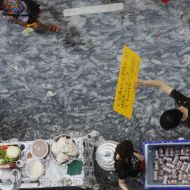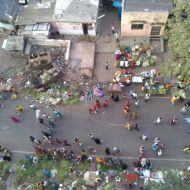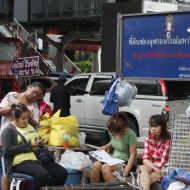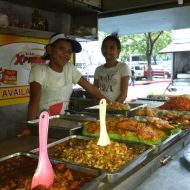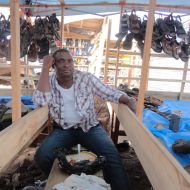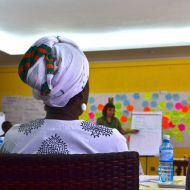An Informal Currency for Slum-Dwellers, or a Nefarious Separatist Plot?
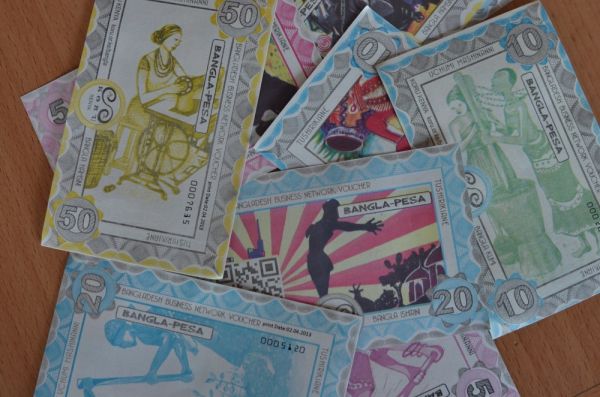
Bangla-Pesa notes, an alternate currency that helps stabilize slum-dwellers’ finances.
Emma Onyango is a 40-year-old widow who supports eight children in a slum called Bangladesh near the Kenyan coastal city of Mombasa. Only one child, a 14-year-old daughter, is hers. The rest are orphans. Onyango has lived there since she moved from her family’s inland village years ago in hopes of finding better work. But like many rural-urban migrants, she barely scrapes by, selling tomatoes and drinking water to earn around 500 shillings ($5.88) a day. It’s not enough to feed everyone, so she relies on donations to keep bellies full. Still, there are nights when there simply isn’t enough to eat.
With so much to worry about and her ancestral home far away, Emma isn’t the type of person one expects to be involved in a plot to secede the coast from the rest of Kenya. But that’s what she was accused of last month after she started trading some colorful pieces of paper in exchange for sugar, flour and potatoes. On May 29, police threw Onyango and five others in jail, saying they were subverting the Kenya shilling in the name of the Mombasa Republican Council (MRC), a radical coastal separatist organization.
“It was just like [I was] someone who had killed,” Onyango said of the rough treatment by police, who placed her in a crowded cell with no blankets for two nights. “They didn’t even tell us the charges.”
Onyango is no separatist—police searches found nothing linking her activities to the MRC—and the colorful papers she was trading were marked as business vouchers, not money. Indeed, they were introduced by an American econo-physicist named Will Ruddick, who, along with his Kenyan wife, operates an NGO in Mombasa called Koru-Kenya.
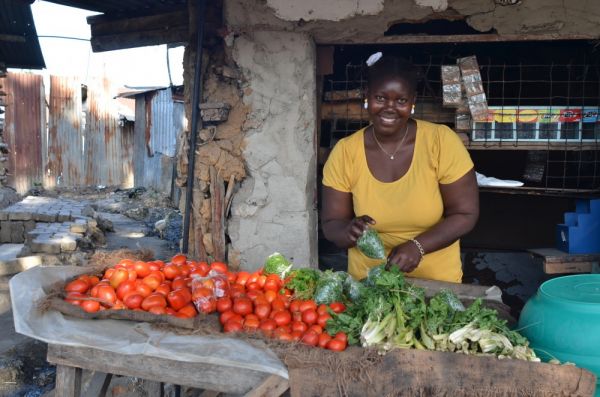
Emma Onyango sells tomatoes, kale and water to support eight children. She used Bangla-Pesa to buy sugar, flour and potatoes before being jailed.
But a sensational news story in a major national newspaper last month declared the use of the vouchers, called Bangla-Pesa (pesa means money in Swahili), an attempt to replace the Kenya shilling. In response, the anti-fraud unit of the Central Bank of Kenya ordered local police to arrest those behind it. Bangla-Pesa’s strange story is an example of the struggles faced by Kenyans in informal settlements, where residents, separated from their homelands but not fully integrated into urban centers, must invent uncommon solutions for everything from water and electricity to personal finance, often to the confusion of conservative authorities.
Ruddick, who first came to Kenya in 2008 as a Peace Corps volunteer, explained the basis for Bangla-Pesa. “If you can essentially acknowledge that money is based on trust,” he said, “you can come up with ways that communities can tap into their own abundance and tap into their own means of exchange.” In Bangladesh, there’s an abundance of goods and services, but residents who need them can’t afford them, so they go to waste. Bangla-Pesa aimed to bridge the gap between waste and want.
“This boda-boda [motorcycle taxi] driver could be carrying twenty people a day,” Ruddick said, referring to a popular and cheap mode of transportation. “But actually he only carries ten because those other ten don’t have the cash to pay him.” With Bangla-Pesa, someone like Onyango, who normally would walk to the market to buy her daily stock of tomatoes, can purchase that motorcycle ride, and the driver could use the earned Bangla-Pesa to purchase her tomatoes later, which otherwise might have spoiled for lack of buyers. Since making a direct trade between two very different goods or services is difficult and inefficient, the Bangla-Pesa, which is worth the equivalent of Kenya shillings, acts as a stand-in to keep track of the barter. “It is just something that represents a debt,” said Onyango.
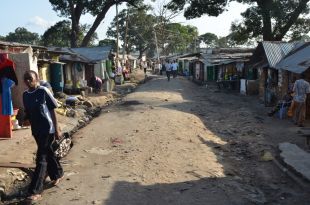
A street in the slum of Bangladesh.
Onyango said she wasn’t given a chance to explain that concept before being jailed, and it wasn’t until days later that she, Ruddick and four other Kenyans were charged with forgery. After posting bail – 100,000 shillings ($1,176 USD) for Ruddick, and 50,000 shillings ($588) for each of the five Kenyans – the trial was set for July. Ruddick showed me original invoices for all the printing services for Bangla-Pesa, as well as permission from local authorities to introduce complimentary currencies in Bangladesh. Since then, prominent members of Kenya’s business community, including Ory Okolloh, former policy manager for Google in Africa, and Jimnah Mbaru, former chairman of the Nairobi Stock Exchange, have posted tweets in support of Bangla-Pesa.
A spokesperson from the local Criminal Investigation Department, which made the arrests, would not comment on the case, and the Central Bank of Kenya’s bank fraud unit, which ordered them, was not available to comment when called repeatedly.
Though Ruddick introduced Bangla-Pesa, a collection of local small enterprises called the Bangladesh Business Network (BBN) actually carried out the initiative. They held seminars in church basements and community centers to teach business owners how the vouchers worked, and pulled input from the community for the images on the notes. Since over 75 percent of small businesses in the BBN are run by women, for the vouchers’ design BBN members chose pictures of women doing typical jobs like sewing and grinding maize while standing between rural and urban spaces to reflect the uncertainty of slum life. A local artist drew the pictures.
On May 11, Bangla-Pesa launched. Each member of the BBN received 400 Bangla-Pesa, but 200 were held back by the network to pay for community service projects like trash pickups or tree plantings. (Members would choose these projects in a sort of transparent self-taxation scheme). By May 29, when the police shut it down, there were 109 participating businesses ranging from tailors to water vendors, each backed by four other businesses in case of “default,” i.e., refusing to accept Bangla-Pesa.
One businesswoman in the BBN was Fatuma, a 39-year-old single mother of four who sells dried fish and fried-dough cakes near the Bangladesh market. Fearing the police, she had torn off her stall the colorful sticker that marked her business as being part of the BBN, and wouldn’t give her real name. Fatuma said she usually earns 500 shillings in a day, putting her family just above the poverty line of a one U.S. dollar (85 shillings) a day. But Bangla-Pesa gave her extra security by helping her cut costs and extending her buying power.
Fatuma, who said her gross income each day was about 2,000 shillings, said she might throw out up to 200 shillings of spoiled stock each day. But she sold some of that extra stock for about 50 Bangla-Pesa each day, thus reducing waste by at least 25 percent and giving her extra “cash” to buy things like maize and soap. That extra buying power was crucial on slow business days, including the afternoon I spoke to her. “For women like me who don’t have a husband and who have kids, in a day like this where you’ve not sold anything, it would be better to have Bangla-Pesa to go get some food,” she said.
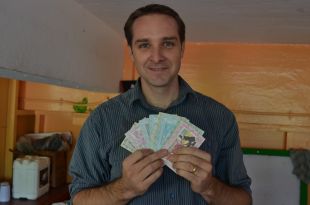
Will Ruddick, cofounder of Koru-Kenya, holding Bangla-Pesa notes.
Providing that cushion in a volatile informal economy is exactly the point of Bangla-Pesa, said Ruddick. “The whole economy sort of collapses on a regular basis here,” he said, citing baseline data taken by Koru-Kenya in Bangladesh before introducing the vouchers. That data showed Bangladesh residents earning on average 137 shillings ($1.61) on a normal day. But when the slum economy collapses—on Mondays, for example, after weekly savings were spent over the weekend, or when parents pay school fees in January—per capita income drops to 82 shillings (96 cents) a day, below the poverty line. There are booms too, such as after the harvest or during tourist season, when average profits shoot up to 364 shillings ($4.28) per person per day. Those dramatic swings between good and bad days represent the difference between Fatuma’s four kids going to bed hungry versus her having enough to invest in new cookware. Stabilizing such a spread with an alternate currency system makes life more predictable.
Ruddick said Koru-Kenya only analyzed results for the first week of the voucher program before police confiscated the rest of their data. Even so, they found that on average BBN members used about 70 Bangla-Pesa each day, a 20 percent increase in trade. To Ruddick, Bangla-Pesa represents a cheap and effective development model. “This entire system only costs about 4,000 euros [for printing and community outreach] to implement,” he said. “We can, in one month of trading by the basic calculations, facilitate 4,000 euros of transactions. I don’t know of any other sort of development program that can do that.”
Such positive results aren’t entirely unexpected. There are plenty of successful complimentary currencies around the world, from Switzerland to Brazil, including a few in Kenya. In 2010, Ruddick oversaw a pilot project similar to Bangla-Pesa called Eco-Pesa in the Kongowea slum. That project used 20,000 shillings ($235) worth of Eco-Pesa but facilitated 30,000 shillings ($353) worth of trade, earning praise and media attention.
Still, Ruddick said Bangla-Pesa will be his last complimentary currency in Kenya if the forgery charges stick, which could potentially land him in prison for years. Fatuma, the mother of four living at the poverty line, would feel the impact, too. “I’d really love [Bangla-Pesa] to be back,” she said. “It used to help me.”

